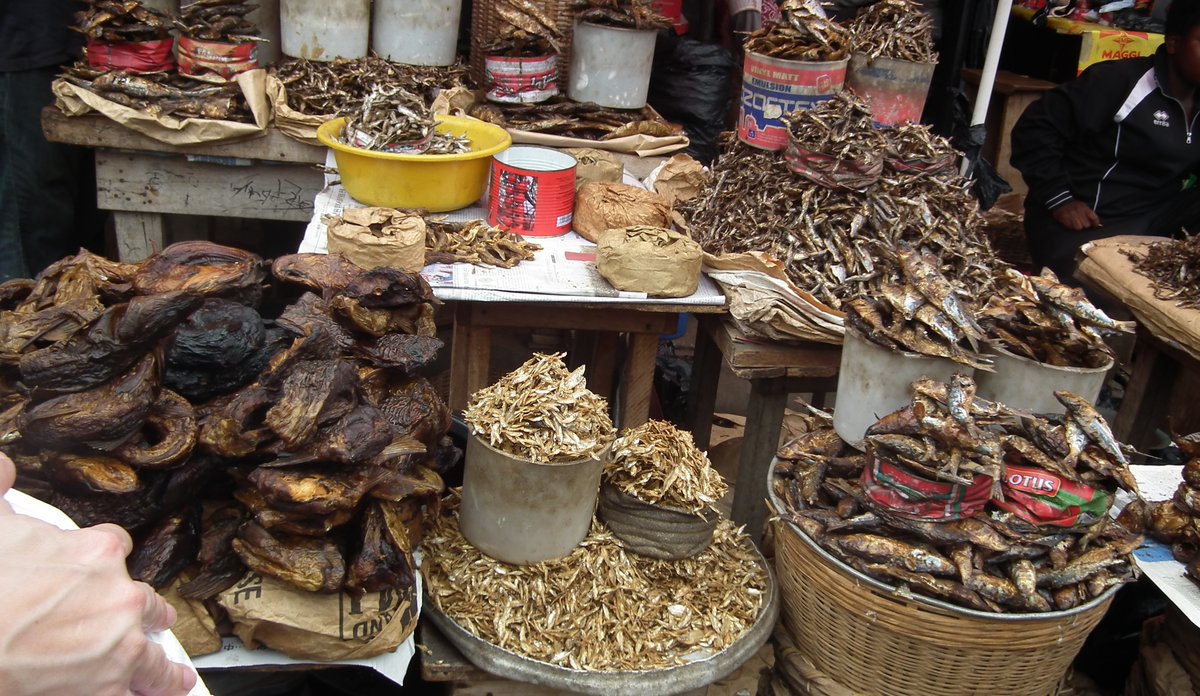Sustainable aquatic foods can play a critical role in global food security and nutrition

Small dried fish being sold at a street market in Ghana.
Photo: Astrid Elise Hesselberg / IMRPublished: 29.07.2021 Updated: 06.09.2021
The UN Secretary-General António Guterres has invited to a global summit on sustainable food systems in New York in September this year. The summit will draw the world's attention to the fact that we must all work together to change the way we produce, consume and think about food.
Hunger and malnutrition are increasing globally, and more than 820 million people, 11 percent of the world's population, are currently starving. By 2030, hunger and malnutrition should be eliminated. This is one of the UN's Sustainable Development Goals (SDG). To achieve this goal, we must include all food sources. Aquatic foods are foods from the sea, rivers and inland waters. Sustainable aquatic foods can play a critical role in global food security and nutrition.
Still, aquatic food is often excluded from discussions on food and nutrition policy. Fisheries and aquaculture policies often focus on biological productivity and economic efficiency rather than food security and nutrition.
For this reason, the UN asked Norway to establish the global network “Sustainable Food from the Oceans and Inland Waters for Food Security and Nutrition”, with a view to increase the contribution from fisheries and aquaculture to combat hunger and malnutrition.
Aquatic food is a unique source of omega 3 fatty acids, readily available protein and essential micronutrients such as vitamins A, B12 and D, and calcium, iodine, zinc, iron and selenium. Fish and other aquatic foods are foods that provide many benefits to public health, especially for children and mothers.
As parents, we want to provide our children with the best possible diet, which is both safe and healthy. The advice given to pregnant women and parents of young children should be based on research and the best possible knowledge. In our research, we have found that many pregnant women ingest too little iodine, that a good fatty acid status can prevent postpartum depression, and that both these nutrients are important for children's development.
At the Institute of Marine Research, Norway, we document levels of nutrients and contaminants in aquatic food both nationally and globally. Relevant, reliable and up-to-date analytical data are essential to be able to calculate nutrient intake in humans, declare nutrients in food, and research the connection between intake and health outcomes. This in turn forms the knowledge base for dietary advice, and nutrition and health policies.
The Institute of Marine Research’s seafood database contains data from the last 15 years and is updated regularly. The database currently contains information on more than 140 nutrients and environmental contaminants in more than 60 species and 50 seafood products. As part of the EAF-Nansen program, we collect fish from the seas around Africa and Asia and help to fill knowledge gaps with local data on nutrients and environmental contaminants.
The Nobel Peace Prize in 2020 went to the World Food Program (WFP) for its efforts to combat hunger. Recently, Dr. Shakuntala Haraksingh Thilsted won the World Food Award in 2021 for her influential work on nutrition, fish and aquatic food systems.
Both these awards are inspiring and motivating for those who work to increase knowledge about, and the use of, aquatic food in a sustainable and robust food system. Our hope is that the food prize will contribute to aquatic food receiving more attention as a contribution to better food safety and nutrition, both nationally and globally.
Fish as a source of important micronutrients deserves increased attention, and aquatic food should be considered in addition to or instead of supplements and enrichment of other foods.
Thilsted’ s work in Bangladesh provides a good example of the role aquatic food should play. Based on local recipes, she helped develop nutritious products aimed at mothers and children. Sun-dried whole small fish were used to make fish chutney, and fishmeal was added to porridge. In addition to being nutrient-rich products, this also contributed to reduced food waste and increased incomes for local producers. Such nutrition-sensitive innovations can improve the diet, nutrition and livelihoods of vulnerable children, women and men in low- and middle-income countries around the world.
If we manage water resources in a sustainable way and keep seas, lakes and rivers clean, food from these ecosystems can contribute to both present and future food security and nutrition challenges. The UN Food System Summit in September is a golden opportunity to put sustainable aquatic food on the agenda.
